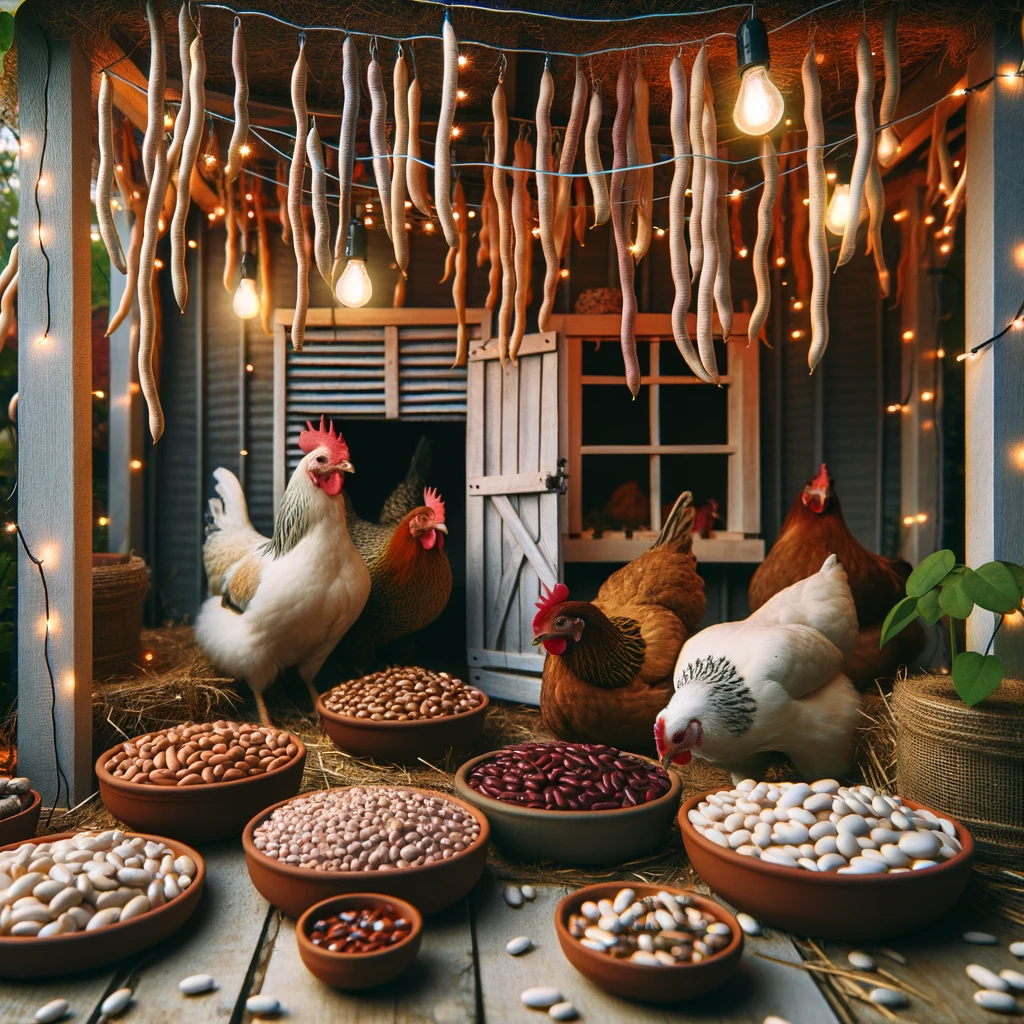
.
Chickens can eat cooked beans as an occasional treat, but never raw ones. Raw beans contain a toxin called phytohaemagglutinin, which is harmful to chickens and can even be fatal. So, if you’re sharing your dinner, make sure those beans are well-cooked first.
Are Certain Types of Beans Safer for Chickens Than Others?
Yes, certain types of beans are safer for chickens than others. Cooked, plain beans like black beans, pinto beans, or navy beans are generally safe. Avoid feeding raw or seasoned beans, and never provide toxic varieties like castor beans.
Should Beans Be Cooked Before Feeding Them to Chickens?
Yes, beans should be cooked thoroughly before feeding them to chickens. Cooking helps break down compounds that could be harmful and makes the beans more digestible, preventing potential issues.
How Much Beans Can Chickens Safely Consume?
While cooked beans are a fun treat, keep portions small as they’re meant as a supplement, not a staple. Aim for around 10% of their daily food intake, which for a typical chicken eating 100g daily, translates to roughly 10 grams of cooked beans. Remember, variety is key to a healthy chicken diet, so mix things up with other treats and veggies!
Can Baby Chicks Eat Beans, or Is It Only Suitable for Adult Chickens?
Baby chicks can eat beans, but it’s advisable to introduce them gradually into their diet after they transition from chick starter feed. Ensure the beans are cooked, soft, and chopped into small, manageable pieces for young chicks.
Do Chickens Like the Taste of Beans?
Whether chickens enjoy the taste of beans depends on the individual bird! Some peck with enthusiasm, while others might show little interest. Offering them small amounts alongside their regular feed can help them develop a taste for these protein-packed treats.
Are There Any Health Benefits of Feeding Beans to Chickens?
Yes! Cooked beans offer a protein & fiber boost, aiding digestion and feather growth. They also contain vitamins & minerals, supporting overall health and potentially boosting egg production. However, keep portions small and remember a balanced diet is key!
Can Beans Affect Egg Production or Quality in Chickens?
While cooked beans offer health benefits, research on their impact on egg production is mixed. Some studies show no effect, while others suggest higher egg mass or yolk color. However, excessive bean intake can affect egg quality, so keep portions small and focus on a balanced diet for optimal egg production.
Should Beans Be a Regular Part of a Chicken’s Diet or Only Given Occasionally?
Beans should be given occasionally rather than being a regular part of a chicken’s diet. While they offer nutritional benefits, a well-balanced commercial feed should remain the primary source to ensure optimal health and egg production.
How Often Can Chickens Be Fed Beans?
Consider cooked beans an occasional treat, not a daily staple. Aim for small portions (around 10% of their daily food) a few times a week, mixed with other treats and veggies, to keep their diet balanced and their taste buds happy!
Can Chickens Eat Both Fresh and Dried Beans?
Never offer your chickens raw beans, fresh or dried, as they contain a harmful toxin. Only cooked beans are safe, regardless of freshness, so skip the raw offerings and treat your feathered friends to a well-cooked bean surprise!
Are There Any Toxic Beans or Bean Varieties That Chickens Should Avoid?
Yes, there are toxic beans and bean varieties that chickens should avoid. Beans like castor beans contain toxic compounds and should never be fed to chickens. Stick to safe varieties like black beans, pinto beans, or navy beans, cooked thoroughly.
What Are the Signs of an Adverse Reaction to Beans in Chickens?
Watch for these signs if your chicken consumed beans: loss of appetite, lethargy, diarrhea, vomiting, weakness, breathing trouble, tremors, or seizures. If you see any, seek immediate veterinary attention! Remember, prevention is key: only offer cooked beans in small amounts.
Can Beans Be Mixed with Other Foods in a Chicken’s Diet?
Absolutely! Mixing cooked beans with other foods is a great way to add variety and nutrition to your chicken’s diet. Just remember to keep the beans a small portion (around 10% of their daily food) and mix them with other healthy options.
Are There Any Chicken Breeds That Particularly Benefit from Eating Beans?
While all breeds can safely enjoy cooked beans in moderation, specific benefits tend to be individual rather than breed-based. However, breeds with higher protein needs, like active layers or large breeds, might find the protein boost from beans particularly helpful. Remember, moderation and a balanced diet are key for all feathered friends!
*Always speak with your veterinarian before adding a new food to your chicken’s diet.